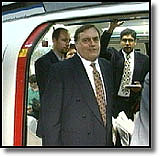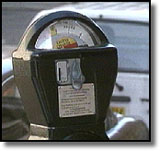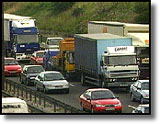
|
Search for Transport SolutionsThe Government has published its ideas for a new, integrated transport policy - warning motorists in particular that they face "some stark and difficult choices".The clear emphasis is on getting people to leave their cars at home and use public transport. Road pricing and a tax on company parking spaces are just some of the ideas being put forward.
The discussion document says rail privatisation has "fragmented the network and threatened services". It also contains proposals for greater regulation of bus services. The Government will draw on the responses to the document in preparing a transport White Paper, to be published next year.
|

|
| John Prescott wants more people to use public transport: |
|
|
| "I'm going to shift priorities." (Dur:4'17") |
Mr Prescott said that a completely fresh approach was needed to address Britain's transport problems. "We are not ruling out any possibility, we're not ruling out anything. We are looking in a most radical way at how to get the most effective use of public resources and we will do that," he said.
One possibly far-reaching question is whether it would be right to give priority to certain types of transport where road space is scarce.
The document adds: "We accept, however, that there are journeys for which there are no realistic alternatives to the car or lorry."
Asking for views on the best way to cope with congestion and pollution, the document says: "The public mood is for change. We cannot carry on as at present.
"We need to reduce the impact of transport on the air we breathe, on greenhouse gases and on the natural and built environment. We need to make the best use of all our resources, whether economic, environmental or financial.
"Developing an integrated transport policy represents a major shift in direction. We don't just want to stop traffic problems getting worse - we actually want to make things better for people and goods on the move. This is ambitious, but not impossible."
Increased Investment
Both the AA and the RAC welcomed the document but both stressed that getting proper funding for transport was the key.
Steven Norris, the former Tory Transport Minister and now Director General of the Road Haulage Association, said a mixture of "carrot and stick" was required to get people out of their cars. Speaking on BBC Radio's The World at One programme, he warned that major structural changes were needed.
The British Road Federation said a clear direction for transport policy in the long term was vital but improvements would "probably require increased levels of investment over a sustained period".

|
| Drivers could have to pay higher parking charges |
Railtrack said it wholeheartedly supported the plan to get more use out of the railways, while bus and coach group, the Confederation of Passenger Transport UK, said it hoped the Government would recognise and retain "all the benefits that bus privatisation and competition had brought".
Liberal Democrat deputy whip, Andrew Stunell, said: "The first thing the Government must do is act to ensure that there is real investment in public transport."
"Secondly the Government must bite the bullet and adopt a more radical system of incentives for people to drive smaller cars," he said.
Related Sites
External sites are not endorsed by the BBC
Department of Transport homepage
The RAC
The AA
Railtrack
Friends of the Earth
The Green Party
Diana, Princess of Wales, 1961-1997
Conference 97
Devolution
The Archive
News |
Issues |
Background |
Parties |
Analysis |
TV/Radio/Web
Interactive |
Forum |
Live |
About This Site
News |
Issues |
Background |
Parties |
Analysis |
TV/Radio/Web
Interactive |
Forum |
Live |
About This Site
© BBC 1997 |
politics97@bbc.co.uk |
